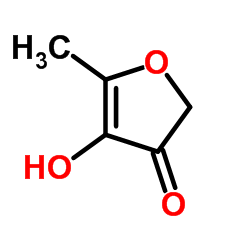Maillard reaction products modulating the growth of human tumor cells in vitro.
Doris Marko, Michael Habermeyer, Monika Kemény, Ulrike Weyand, Ellen Niederberger, Oliver Frank, Thomas Hofmann
文献索引:Chem. Res. Toxicol. 16(1) , 48-55, (2003)
全文:HTML全文
摘要
We investigated the effect of a series of Maillard reaction products formed from carbohydrates under household heating conditions on the growth of human tumor cells in vitro. 4-Hydroxy-5-methyl-3-(2H)-furanone (1) was found to potently enhance the proliferation of human tumor cells. In contrast, the Maillard-type chromophores 2-(2-furyl)methylidene-4-hydroxy-5-methyl-2H-furan-3-one (2), 4-(2-furyl)-7-[(2-furyl)methylidene]-2-hydroxy-2H,7H,8aH-pyrano[2,3-b]- pyran-3-one (6), and 3-hydroxy-4[(E)-(2-furyl)methylidene]methyl-3-cyclopentene-1,2 dione (13) inhibited the growth of human tumor cells in vitro in the low micromolar range. GXF251L cells (gastric carcinoma), synchronized by serum deprivation, were retained in the G1-phase of the cell cycle after treatment with 2, 6, or 13 for 24 h. Concomitantly, a distinct sub-G1 peak was observed, indicative for apoptosis induction. DNA fragmentation was further investigated by ELISA using antibodies raised against histones and DNA. 2 induced a significant increase of fragmented DNA at concentrations > or = 30 microM. After treatment with compound 6, DNA fragmentation was observed at a higher concentration range (> or = 50 microM), whereas incubation with 13 resulted in a marked DNA fragmentation already at 20 microM. On the protein level, the activation of caspase 3, as an early marker for apoptosis induction, was determined. The results were almost identical to those obtained in the DNA fragmentation ELISA. In summary, Maillard reaction products potently modulating the growth of human tumor cells were identified. The Maillard-type chromophores 2, 6, and 13 were found to interfere with the proliferation of gastric carcinoma cells, causing cell cycle arrest and apoptosis induction.
相关化合物
| 结构式 | 名称/CAS号 | 分子式 | 全部文献 |
|---|---|---|---|
 |
菊苣酮
CAS:19322-27-1 |
C5H6O3 |
|
Norfuraneol dephosphorylates eNOS at threonine 495 and enhan...
2009-03-01 [Cardiovasc. Res. 81(4) , 750-7, (2009)] |
|
Investigation of the reaction between 4-hydroxy-5-methyl-3(2...
1999-04-01 [J. Agric. Food Chem. 47(4) , 1626-34, (1999)] |
|
Heterocyclic volatiles formed by heating cysteine or hydroge...
2001-02-01 [J. Agric. Food Chem. 49(2) , 816-22, (2001)] |
|
LuxS: its role in central metabolism and the in vitro synthe...
2002-04-01 [Microbiology 148(Pt 4) , 909-22, (2002)] |
|
An efficient flow-photochemical synthesis of 5H-furanones le...
2012-04-27 [Angew. Chem. Int. Ed. Engl. 51(18) , 4405-8, (2012)] |